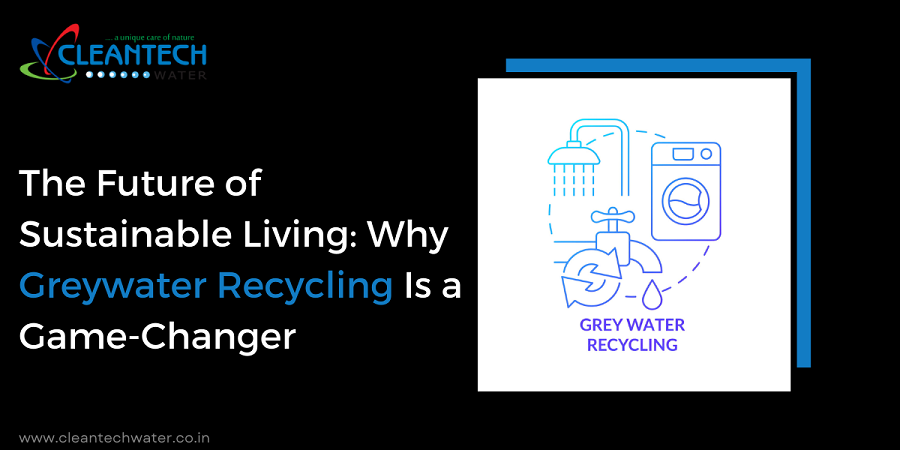As businesses and property owners seek sustainable solutions to address increasing environmental concerns, greywater recycling has emerged as a game-changer in water management. Grey water, which is water from sources like sinks, showers, and laundry, offers a unique opportunity for reuse, reducing the demand for freshwater while mitigating the environmental impact of wastewater. As the world faces mounting challenges related to water scarcity, greywater recycling presents an innovative and practical approach to achieving sustainable water usage on residential and industrial scales.

Understanding Greywater Recycling
What is Grey Water?
Grey water is the relatively clean wastewater generated from everyday household or commercial activities like washing dishes, bathing, and laundering clothes. This type of water differs significantly from black water, which contains toilet waste and is typically more contaminated. Grey water can be easily treated and reused, making it a valuable resource for non-potable applications such as irrigation, cooling systems, or toilet flushing.
Differentiating Grey Water from Black Water
Understanding the distinction between grey water and black water is essential when considering recycling systems. Black water contains pathogens, viruses, and high levels of contaminants from human waste, making it unsuitable for direct reuse without advanced treatment. In contrast, grey water is less contaminated and, with proper treatment, can be effectively recycled and used again, making it an eco-friendly alternative that reduces pressure on traditional water sources.
The Basic Process of Greywater Recycling
Greywater recycling involves a series of filtration and treatment steps designed to remove contaminants and pathogens from the water. These processes can range from simple filtration systems that remove debris and particles to more advanced biological and chemical treatments that further purify the water. Once treated, the recycled grey water can be used for various non-potable purposes, significantly reducing water consumption and contributing to environmental sustainability.
The Growing Need for Greywater Recycling
Global Water Scarcity Statistics
With over 2 billion people living in regions facing high water stress, global water scarcity has become a pressing issue. The increasing demand for water due to population growth and industrial activities has put immense pressure on natural water resources. In fact, the UN has projected that by 2030, the global demand for water will exceed supply by 40%. This alarming statistic underscores the need for innovative solutions like greywater recycling to help conserve fresh water and reduce reliance on overburdened water systems.
Urbanisation and the Increasing Demand for Sustainable Water Management
As urbanisation continues to accelerate, cities are becoming increasingly strained in terms of their ability to supply water to growing populations. Urban areas are major contributors to water consumption, and traditional water sources are struggling to meet the demand. Greywater recycling offers a scalable solution for urban dwellers and businesses to manage their water usage sustainably. This reduces their dependency on municipal water systems and decreases the environmental impact of wastewater.
Environmental Impact of Untreated Wastewater
Untreated wastewater, especially grey water, can lead to serious environmental issues if not properly managed. Wastewater treatment plants are designed to handle the large volumes of sewage and wastewater generated by populations. Still, many systems are overwhelmed, leading to water pollution and contamination of local ecosystems. By incorporating greywater recycling technologies into buildings, businesses, and municipalities, we can reduce the amount of untreated water entering the system. This can help alleviate some of the pressure on wastewater plants and contribute to cleaner, healthier environments.
Technological Advancements In Greywater Recycling
Smart Grey Water Systems For Homes
The growing demand for sustainable living has driven the development of advanced greywater recycling systems tailored for residential use. These systems are designed to filter, treat, and store grey water for reuse, providing homeowners with an eco-friendly way to conserve water. Smart greywater systems are equipped with sensors and automated controls to monitor water quality and usage, ensuring that the water is safe for non-potable applications. These systems are easy to integrate into new or existing homes. They are a practical solution for individuals committed to reducing their environmental impact while lowering water bills.
Industrial-Scale Greywater Treatment Solutions
At the industrial level, greywater recycling has become a crucial component of large-scale water management strategies. Industrial operations, including manufacturing plants, hotels, and office buildings, generate significant volumes of grey water that can be treated and reused to reduce their dependency on municipal water supplies. These facilities can implement more complex treatment systems, such as membrane filtration, biological treatment, and UV disinfection, to meet higher water quality standards. With advancements in industrial-scale systems, businesses can achieve a high degree of water reuse efficiency. This can ensure that water-intensive operations have a minimal environmental footprint.
Integration of IoT and AI in Water Management
The integration of Internet of Things (IoT) devices and artificial intelligence (AI) is revolutionising water management in residential and commercial greywater recycling systems. IoT sensors can provide real-time data on water quality, usage patterns, and system performance, allowing for smarter, more efficient water management. AI can analyse this data to predict future water needs, optimise treatment processes, and detect potential issues before they become critical. This technological synergy makes recycling more efficient and allows businesses to monitor and control their water usage remotely. This in turn contributes to greater sustainability.
Discuss Your Needs with Our Greywater Recycling Expert Now!
Key Benefits of Greywater Recycling
Water Conservation and Reduced Utility Bills
The most immediate benefit of greywater recycling is the conservation of fresh water. By reusing water from sinks, showers, and washing machines, businesses and homeowners can significantly reduce their water consumption. For businesses, this can translate into reduced utility bills and a more predictable water cost structure. In regions where water is scarce or expensive, the savings from implementing a greywater recycling system can be substantial. Additionally, as water costs continue to rise, this offers an attractive solution for future-proofing against rising utility prices.
Environmental Sustainability and Reduced Carbon Footprint
Greywater recycling contributes to environmental sustainability by reducing the demand for potable water. This, in turn, helps to preserve natural water resources, protect ecosystems, and reduce energy consumption associated with water treatment and transportation. As the recycling systems reduce the need to pump, treat, and distribute fresh water, they also lower the carbon footprint associated with these processes. By adopting greywater recycling, businesses and property owners can demonstrate their commitment to sustainable practices and contribute to global efforts to reduce greenhouse gas emissions.
Reduced Load on Municipal Wastewater Treatment Plants
Municipal wastewater treatment plants are often burdened with processing vast quantities of sewage and wastewater from homes and businesses. As the volume of wastewater increases, so does the strain on these facilities, which can lead to inefficiencies and environmental pollution. Greywater recycling systems can ease this pressure by diverting non-potable water away from the municipal system, allowing treatment plants to focus on more critical waste management tasks. This improves the overall efficiency of wastewater treatment and reduces the risk of overflows and contamination of local water bodies.
Applications of Greywater Recycling
Residential Use
In residential settings, greywater recycling can be utilised for various non-potable applications. Recycled grey water can be used for garden irrigation, reducing the need for fresh water in landscapes. It can also be used to flush toilets, significantly lowering household water consumption. Additionally, grey water can be repurposed for laundry, providing an eco-friendly solution for water-intensive tasks. These applications make recycling an attractive option for homeowners looking to reduce their environmental footprint and lower their utility bills.
Commercial and Industrial Usage
Commercial and industrial sectors are major consumers of water, and greywater recycling offers significant potential for reducing their overall water usage. Hotels, office buildings, and manufacturing facilities can benefit from recycling grey water for applications like cooling systems, landscape irrigation, and toilet flushing. By incorporating recycling into their water management strategies, businesses can reduce operational costs and improve their sustainability profile—all while ensuring that they remain compliant with environmental regulations.
Community-level and Municipal Initiatives
Greywater recycling is not limited to individual properties. Community-level and municipal initiatives are becoming more common as cities and regions work to address water scarcity and improve sustainability. Local governments are increasingly investing in greywater treatment infrastructure to provide recycled water for public parks, street cleaning, and landscape maintenance. These large-scale initiatives help conserve water at a community level and can significantly reduce the pressure on municipal water systems, benefiting residents and businesses.
Challenges and Barriers to Adoption
Public Perception and Health Concerns
One of the biggest barriers to the widespread adoption of greywater recycling is public perception. Many people are hesitant to reuse grey water due to misconceptions about its safety. Despite the advanced treatment processes available, concerns about health risks persist. Educating consumers about the differences between greywater and blackwater, as well as the safety of treated greywater for non-potable uses, is essential to overcoming these challenges.
Regulatory Frameworks and Standards
The regulatory environment for greywater recycling varies widely across regions, often complicating implementation for property owners and businesses. In some areas, strict guidelines or unclear regulations can hinder adoption. Developing uniform standards for greywater reuse and ensuring clear regulatory guidance can create a more favourable landscape for investment in recycling systems. Governments and municipalities must strike a balance between safety requirements and encouraging sustainable practices.
Cost Implications for Residential and Commercial Users
The initial investment in greywater recycling systems can be substantial, particularly for commercial properties. Installation, maintenance, and advanced technology integration all contribute to the overall cost. While long-term savings on water bills are significant, the upfront financial burden can deter adoption. Introducing incentives, rebates, and tax breaks for greywater recycling infrastructure can make these systems more accessible to a broader audience.
Future Trends and Innovations
Emerging Technologies in Water Treatment
Future advancements in filtration, disinfection, and sensor technology will improve the efficiency and cost-effectiveness of greywater recycling systems. Innovations in compact, automated units are making systems more user-friendly and adaptable for residential and commercial applications.
Policies and Incentives Driving Adoption
Governments are increasingly implementing water conservation policies and financial incentives to promote greywater recycling. These initiatives will accelerate adoption by reducing costs and encouraging compliance with sustainability goals.
The Role of Education and Public Awareness
Public awareness campaigns highlighting the environmental and economic benefits of greywater recycling will be critical to changing perceptions. Businesses that invest in greywater systems can also benefit from promoting their sustainable efforts as part of corporate social responsibility strategies.
Embrace Sustainable Water Solutions with Greywater Recycling
Greywater recycling is the smart choice for businesses and property owners looking to lead the way in sustainable water management. By investing in a greywater system, you’ll conserve precious water resources, lower your utility bills, and reduce the burden on local wastewater treatment plants. Whether you’re upgrading your facility or planning a new project, Cleantech Water offers a cost-effective, eco-friendly sewage water treatment solution tailored to your needs.
Don’t wait for water scarcity to impact your operations—take proactive steps toward sustainability today. Contact us at info@cleantechwater.co.in or at +91-9558996411 to explore innovative solutions. Learn about local incentives, and discover how greywater recycling can transform your property into a model of environmental responsibility. Let’s work together to build a sustainable future.

